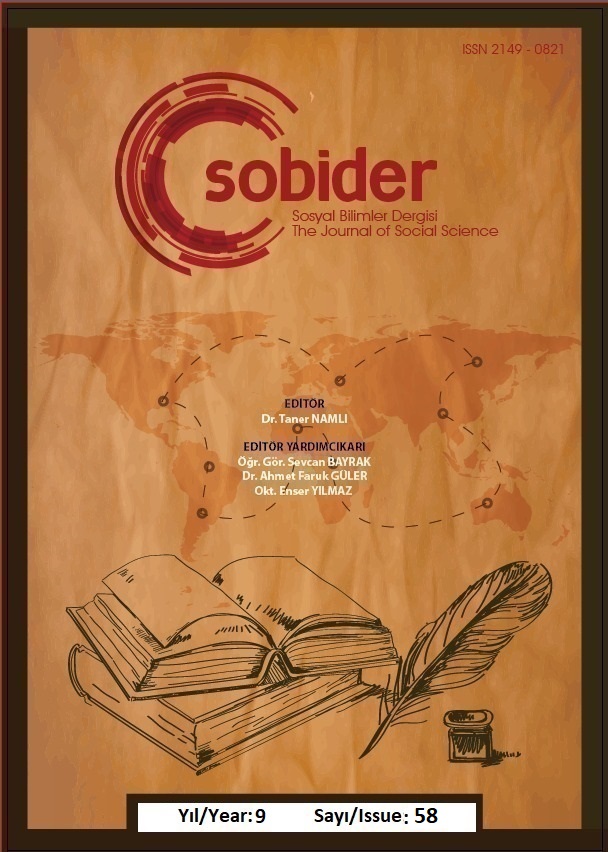OSMANLI'DAN GÜNÜMÜZE TÜRK TOPLUMUNUN İKTİSADİ ZİHNİYET DÖNÜŞÜMÜ, GERİ KALMIŞLIK VE KALKINMA ANALİZİ: SABRİ ÜLGENER
Author :
Abstract
Türk iktisadi hayatının yükseliş ve çözülüş dinamikleri üzerinde duran Sabri Ülgener, gerek batılı düşünürlerin yorumları gerekse geçirdiğimiz tarihsel süreçten hareketle İslâm toplumlarını iktisadi hayatını anlamlandırmaya çalışır. Türk toplumunun 16. Yüzyıldan beri geri kalmışlığının sebepleri üzerinde duran Ülgener, batılı yorumcuların aksine, dinin Türk toplumunun gelişiminde önemli bir yere ait olduğu görüşünü savunur. Türk sanatını, kültürünü, siyasetini belirleyen İslâm’ın aynı zamanda iktisadi hayatını da belirleyen önemli bir norm olduğu, medeniyetin yükselişi ve inhitatında bu normun önemli bir yer edindiğini vurgular. Bu bağlamda insanı “homo econumicus” yani ekonomik bir varlıktan ibaret olarak gören modern iktisadi yaklaşımlardan uzak, insana mânâ vazifesi yükleyen, insanın ekonomik durumunu da dinî ve kültürel referanslarla anlamlandıran bir iktisadi yaklaşımı önceler. Bu durum toplumların düşüncesi dünyasındaki farklı algılamaların ürünüdür.
Keywords
Abstract
Focusing on the rise and disintegration dynamics of Turkish economic life, Sabri Ülgener tries to make sense of the economic life of Islamic societies based on both the interpretations of western thinkers and the historical process we have gone through. Ülgener, who focuses on the reasons for the backwardness of Turkish society since the 16th century, defends the view that religion has an important place in the development of Turkish society, unlike western commentators. He emphasizes that Islam, which determines Turkish art, culture and politics, is an important norm that also determines its economic life, and that this norm has an important place in the rise and decline of civilization. In this context, it prioritizes an economic approach that is far from modern economic approaches that see human beings as "homo econumicus", that is, as nothing more than an economic entity, that imposes a man's duty of meaning on human beings, and that gives meaning to human's economic situation with religious and cultural references. This situation is the product of different perceptions in the world of thought of societies.
Keywords
- Aksoy, A. (2018), Sabri Ülgener Bağlamında Türkiye’de Zihniyet Dönüşümü ve İktisadi Zihniyet, Pamukkale Üniversitesi Sosyal Bilimler Enstitüsü.
- Cengiz, O. (2018), Ülgener’in Ortaçağ İktisat Ahlakı Ve Zihniyet Tahlilinin Teorik Tasnifi, Tarih Okulu Dergisi, Yıl 11, Sayı XXXVI, ss.421-442.
- Çağman, E. (2016), Sabri Ülgener’in Metodolojisi, Kaynakları ve Bazı Kavramlarına Dair Eleştiriler, Marmara Üniversitesi Öneri Dergisi, Cilt 12, Sayı 45, Ocak 2016, İstanbul.
- Çelik, C. (2003), İslam İktisat Ahlakına Dair Birbirini Tamamlayan Bakış Açıları: Weber ve Ülgener Üzerine Karşılaştırmalı Bir İnceleme İslam Araş. Dergisi. C.16,S:4.
- Dağ, M. (Pamukkale Üniversitesi Dr. Öğr.), Ülgener, Zihniyet Ve Din. (www.academia.edu- Erişim:01.04.2020)
- Demirpolat, A. (2002), Ülgener ve Geri Kalmışlık Sorunsalı, Marife, yıl. 2, sayı 3: 285-297
- Doğan, Ş. (2015), Max Weber ve Sabri Ülgener'de Zihniyet ve Din, Kırıkkale Üniversitesi Sosyal Bilimler Dergisi 5, sy.2: 203-226
- Ertüzün, T. (1987), Prof. Ülgener'in İktisadi Kalkınma Yaklaşımı, İstanbul Üniversitesi İktisat Fakültesi Mecmuası, C. 43:13-25
- Ertüzün, T. (2011), Prof. Ülgener’in İktisadi Kalkınma Yaklaşımı, edi. Sabri Fehmi Ülgener: Küreselleşme ve Zihniyet Dünyamız [Editör: Murat Yılmaz], Kültür ve Turizm Bakanlığı
- İlgen, A. (2007), Yorumlayıcı Anlama İle Nedensel Açıklamanın Sınırlarında Ufkumuza Düşen Bir Aydınlık: Sabri F. Ülgener, Türk Yurdu Dergisi, c.27,s.238:25-29.
- İlgen, A. (2010), Türk Modernleşmesi Ve İktisadi Zihniyet, Türkiye’de Değişim Sempozyumu, Gazi Üniversitesi, s. 257-284.
- Özkiraz, A. (2000), Sabri F. Ülgener’de Zihniyet Analizi, Ankara Yayınevi, Ankara
- Özkiraz, A. (2007), Sabrı F. Ülgener’de Zihniyet Ve Geri Kalmışlık, İ.Ü. Siyasal Bilgiler Fakültesi Dergisi No:36
- Özkiraz, A. (2007), Sabri F. Ülgener'de Zihniyet ve Geri Kalmışlık, İstanbul Üniversitesi Siyasal Bilgiler Fakültesi Dergisi 36: 35-59.
- Özsöz, C. (2017), Weber Ve Ülgener’in Din Ve Ekonomi İlişkisine Dair Temel Yaklaşımları, Uluslararası Sosyal Araştırmalar Dergisi, Cilt.10 Sayı.: 51 :557-561
- Sayar, A. G. (1998), Bir İktisatçının Entelektüel Portresi Sabri F. Ülgener, Eren Yayıncılık, İstanbul.
- Sayar, A. G. (1999), Osmanlı Devleti’nden Türkiye Cumhuriyeti’ne İktisadi Bir Verasetin Anatomisi, Yeni Türkiye Dergisi Osmanlı Özel Sayısı, VII: 569-573. Ankara
- Sayar, A. G. (2007), Bir Entelektüelin Portresi: Sabri F. ÜLGENER, Ötüken Neşriyat, İstanbul
- Ülgener, S. (1981), İktisadi Çözülmenin Ahlak Ve Zihniyet Dünyası, Fikir Ve Sanat Tarihi Boyu Akisleri İle Bir Portre Denemesi,Gözden Geçirilmiş İkinci Baskı, Er Yayınları,
- Ülgener, S. (1983), Zihniyet, Aydınlar ve İzmler, Ankara.
- Ülgener, S. (2006), İktisadi Çözülmenin Ahlak Ve Zihniyet Dünyası, Derin Yayınları, İstanbul.
- Ülgener, S. (2015), Zihniyet ve Din, Derin Yayınları, İstanbul.
- Yazıcıoğlu, E. (2008), İktisadi İnhitat Tarihimizin Ahlak ve Zihniyet Meseleleri Üzerine Bir İnceleme, Ankara
- Yılmaz, F. (2011), Sabri Fehmi Ülgener ve Liberalizm, edi. Sabri Fehmi Ülgener: Küreselleşme ve Zihniyet Dünyamız [Editör: Murat Yılmaz], Kültür ve Turizm Bakanlığı.





